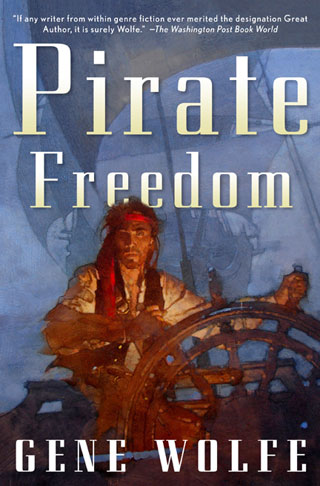Book Review: Pirate Freedom
by Joe Libutti
Pirate Freedom
By Gene Wolfe
Tor Books, 2007

One of the most highly respected authors of genre fiction writing today, Gene Wolfe continues to produce some of the least conventional science fiction available. In Pirate Freedom, the only extraordinary element employed is an instance time travel depicted with such nonchalance you could almost overlook it. Our narrator himself hardly even reacts to his predicament, accepting the fact that he is now hundreds of years in the past without even a hint of concern. Gene Wolfe frequently writes his novels as though they were memoirs of his characters, and Pirate Freedom is no different. Father Christopher’s time slip works to provide us a narrator capable of relating the life of a pirate with the perspective of the modern day.
Released hot on the heels of the resurgent interest in pirates sparked by a certain Disney trilogy, Wolfe sets to work correcting our conception. Meticulously researched, you could almost believe it actually was a firsthand account. Wolfe frequently delves into the complexities of sailing—no easy task in these harsh times of crude technology. Keeping the ship moving and moving fast is difficult enough, but navigating is truly a feat involving constant complex calculations. These banalities of pirate life, while they give us a sense of the skills a good pirate would possess, do occasionally become too complex for us less sea-faring folks to understand. This problem is especially present in scenes where they discuss and implement different riggings to increase their speed, the language becoming too steeped in the technicalities of boating to easily grasp.
Thankfully, these moments are brief and there’s no shortage of pirate action. Early on Chris explains that pirates were essentially the mafia of the high-seas in their day, and once that connection is made it really does a lot to explain how the whole system worked. Throughout the novel we get a good idea how both individual ships and whole fleets would function as they embark on some grand schemes requiring the whole “family” as it were. These were nonetheless ruthless men and there’s no lack of brutality towards their enemies and occasionally each other, as in-fighting and mutiny was hardly unheard of. Half the difficulty of captaining a ship seems to lie in keeping the crew happy in order to maintain their loyalty.
Pirate Freedom is a down and dirty look at the pirate’s life, covering the menial labor as well as the grand heists. There’s plenty of substance to keep anyone remotely interested in those swashbuckling scurvy dogs happy, but if you’re in it for the science fiction aspect—the cover proclaims it a “Sci Fi essential book”—you may be disappointed. The science fiction here is downplayed dramatically and is really only a minor device. That said it does significantly enhance the novel, and the interjections of our narrator from the present never muddle the pace. Gene Wolfe remains not only a giant of science fiction, a great author by any standards, and a phenomenal storyteller, but he’s also one of the most consistent and readable authors around today.
—joe libutti
blog comments powered by Disqus|
Issue Navigation> Issue Index > v7n37: In The Aftermath (9/11/08) > In The Margins > Book Review: Pirate Freedom This Week's Issue • Artvoice Daily • Artvoice TV • Events Calendar • Classifieds |









 Current Issue
Current Issue